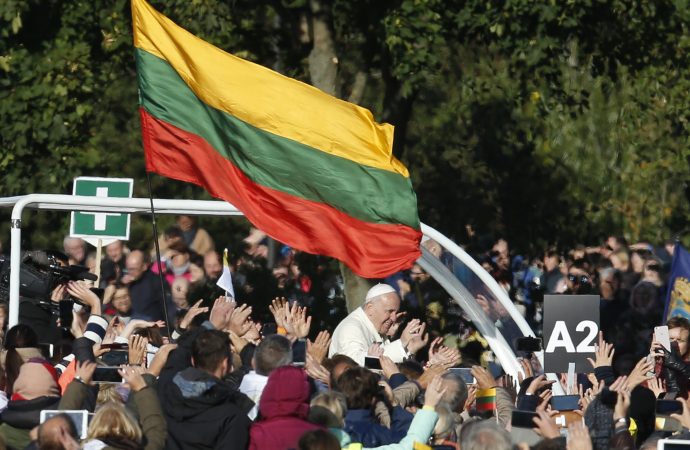Speaking to his brother Jesuits in Lithuania last month, Pope Francis solicited their support in moving forward the work of the Second Vatican Council.
“I believe the Lord wants a change in the Church,” he told 28 Jesuits during a private meeting during his trip to the Baltics. “I have said many times that a perversion of the Church today is clericalism…I know that the Lord wants the Council to make headway in the Church.”
“Historians tell us that it takes 100 years for a Council to be applied,” he added. “We are halfway there. So, if you want to help me, do whatever it takes to move the Council forward in the Church.”
The pope’s remarks were published in full on Wednesday by the Vatican vetted Jesuit journal La Civiltà Cattolica.
Among the other topics the pope addressed were concerns of vocational burnout by Jesuit priests, the need for ongoing ecumenical dialogue, the importance of Jesuit education, and how the sacrament of confession must be marked by mercy.
Lithuanian Archbishop Lionginas Virbalas of Kaunas told Francis that the province had dwindled from over 1,000 members to just over thirty and will soon merge into a larger, singular province with Austria, Germany, Switzerland, and Hungary. Consequentially, some of the Jesuits now take on 3-4 jobs to support the work of the Society.
The pope encouraged the Jesuits not to neglect their spiritual and physical health, warning, “the evil spirit does lead us to a sort of ‘not-working-enough complex.’”
“Sometimes we feel guilty just because with prudence we take a little bit of care of our own health! This is a temptation,” he heeded. “Jesuits must work without losing peace, without losing the encounter with the Lord, and without losing rest.”
He then went on to urge attention to pastoral care, particularly among those suffering in a region still recovering from its past Nazi and Soviet occupation.
“I advise you not to be afraid of descending into the hell of the people,” he pleaded. “Sometimes, this means entering the field of the devil. But suffering, be it human, social, that of the conscience… we need to go down into hell, we need to be there. Touch the wounds. And touching people’s wounds, you touch the wounds of Christ. The Jesuit should never be afraid of this.”
One Jesuit spoke of the fruits of ecumenical relations with other Christian traditions, especially among the country’s Lutherans, some of who practice Ignatian spirituality.
“Dialogue adds, it doesn’t take away,” said Francis in agreement.
One deacon in attendance told the pope that his words on the sacrament of Reconciliation from earlier in the trip had been particularly moving for him as he prepares for ordination and the ability to offer the sacrament himself.
“Nearness is God’s oldest stance,” Francis told him. “He himself comes to us this way: in nearness.”
“God became down-with-us, near in the flesh. All pastoral activity has to remember this or otherwise fail. God became near to the marginalized, to the dead - whom he raised - and to the sinners, the tax collectors, the prostitutes… The pure, the religious professionals were scandalized,” he continued.
“If a priest ungraciously chases away a penitent, the bishop needs to ask himself if he should take away that priest’s license to hear confessions, for the confessor should be paternal. The confessor is there to embrace the prodigal son, the lost child. And always, always, if you are a father, you will always find a way to forgive,” he maintained.
“It’s clear that I am not saying that we have to be indulgent. It is true that one thing is mercy and another thing is being indulgent. We have to be fathers, merciful fathers,” Francis challenged. “To be a good confessor, you have to be a great forgiver… or be deaf!”
Finally, Francis urged the community not to neglect their work in education, a long-time trademark of Jesuits worldwide.
“Education engages the whole person, not only the head,” said Francis. “I’ve said this many times and I’ll repeat it: there is a language of the head, but there is also the language of the heart, of sentiment. You need to educate the heart.”
“Please, don’t let the Jesuits abandon education,” he implored. “The Society should never abandon this mission, as it is a strong road.”
The private, hour-long meeting took place at the Lithuanian nunciature in a question and answer format during Francis’s September 22-26 trip to Estonia, Lithuania and Latvia.

